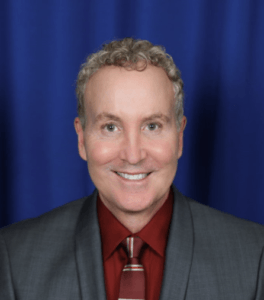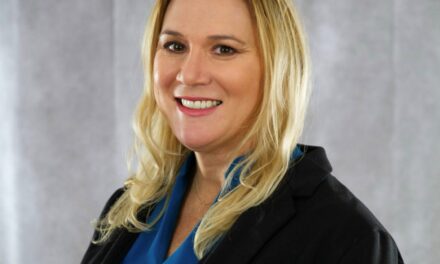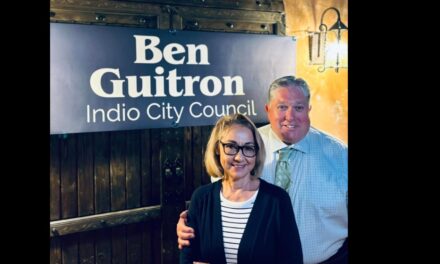PALM SPRINGS — Few could have predicted on Dec. 4, 2019, the day Geoff Kors was sworn into office as mayor, that a worldwide coronavirus pandemic would cripple this international tourist destination.
With most businesses shuttered and residents ordered to stay home, Kors is concerned about residents and businesses alike in this community, but he wastes no time wringing his hands. While meeting with bankers, talking with elected officials, and helping make sure residents are staying home, Kors is already looking to the day when COVID-19 is no longer a threat.
He has a confident command of resources that are likely going to be available to businesses and employees alike. But that’s not enough. He wants to empower residents with the information and won’t be satisfied until he does.
One of the hallmarks of his re-election campaign in November 2019 was a robust series of listening meetings. He is listening now.
This crisis will be defining moment for Kors.
As Tom Landry, head coach of the Dallas Cowboys, once said, “Leadership is a matter of having people look at you and gain confidence, seeing how you react. If you’re in control, they’re in control.”
Kors in undoubtedly in control.
Following is a Q&A Kors granted Uken Report.

Mayor Geoff Kors
Uken Report (UR): Mayor Kors, what do you say to residents who are currently without a job, told to stay home, and most likely are living in fear and/or panic as the number of COVID-19 cases continues to rise?
Mayor Kors: For our residents, first and foremost, I want to thank them. People have been so good about following the guidance that had been put out and when it became an order and are following it. So many people have reached out to offer help to neighbors, strangers to go grocery shopping for people who are in higher risk categories. It really shows the kind of community we are.
But, of course, lots of people are scared. It’s a very scary time. We’ve never had an experience like this. And so, it’s important for people to remember that the actions that the state and the city have taken are designed to protect people, designed to stop future spread. And when the businesses and residents follow these requirements, they’re going to help do that. And it’s not just for each of us, it’s for our neighbors. And that’s what’s so heartwarming about our city.
People who are not in the category of people who are most likely to get seriously sick or potentially die from this virus are following these so they don’t get (infect) someone else who might be at higher risk. And so, the best thing is to stay at home, to limit your shopping to truly essential and as infrequent as possible, and reach out to your neighbors and people you don’t know and offer to help. And if you need help reach out as well.
The city is doing a mailing that is going to go out giving people some information, but mostly to let them know there’s an email, there’s a phone number, and there’s a website that we’re going to continually update so they get as much information as they need in one place. Information for residents, information for workers, information for businesses.
Everyone, just about, is going to be hurting financially, and we’re working to get as much information from the state and, when the legislation is finalized for the stimulus package from, the federal government, so we can get that out to people, so they know the resources that are going to be coming and that they have available. Ultimately, we’re an incredible community, and I believe we will get through this because we’re going to get through this together.
UR: Is the city and or county making progress and flattening the curve, or is it too soon to tell?
Mayor Kors: I think that we are going to see a flattening of the curve because of these actions throughout the state of California. But we’re probably going to see a continued spike because there are a lot of people who are infected who don’t know it. And it will take at least two to three weeks before people either do show symptoms and self-quarantine, and now we’re all quarantining, or know that they do have the virus.
Most people will be fine, not great, but they’ll get sick like with the flu and some other symptoms. And then there’ll be a group that will need a hospital, and need more care. But it will take a while for this to level out. A lot of countries are trying to close down their whole country for two to three weeks because then you know everyone who’s infected, and you get through it much quicker.
South Korea tested everyone. There are things that can be done, so we get through this quicker. And although we would be better if it was on a national level, I think the state doing it is really going to help all of us see the spread start to slow down, but it may take a few weeks of it getting worse before we see the results of these actions. And that’s one of the issues here is that with any infectious illness you don’t see the impacts right away. And so, you have to be ahead of it, and for a few weeks I think we’re going to see more cases as more people get tested. But then hopefully we’ll see that flatten out.
UR: Thank you mayor. I believe the current stay-at-home order will be re-evaluated on April 2nd at City Council. Is that correct?
Mayor Kors: It was going to be re-evaluated on April 2nd at City Council. That said, we’ve pretty much conformed our order to the one Governor Newsome issued. He has said that’s indefinite until he deems it’s safe to end it. And nothing that he has said gives the impression that he will be ending it in 10 days.
Currently in the state of California, no one should be leaving their home unless it’s for one of the listed essential reasons, going out to the pharmacy or to get groceries. If someone’s in an essential job like public safety, or health care, or certain government jobs, people can take a walk as long as they’re keeping appropriate distancing of at least 6 feet. But other than that, people should be staying at home. And that’s how we’re going to flatten the curve and stop the spread of the virus. Because we’re not only trying to stop ourselves from getting sick, we’re also trying to protect our neighbors as well.
UR: I’m sure you’ve heard the President say that he wants to open the country by Easter, but I’m hearing you say that you probably don’t see that happening. Is that right?
Mayor Kors: You know, by mid-April we’ll have a much better sense of the situation in California, and decisions can be made. The governor said not to expect anything too soon. It could be longer than that. So, we’ll just have to see how it goes. Ultimately the faster we stop the spread of the virus and get through this, the less damage to human life, and to the economy.
UR: Mayor, there was talk, I believe, of an ordinance, a local ordinance that will prevent renters from being evicted during this challenging time. Is that still coming, or in the works, or did I misunderstand?
Mayor Kors: No, so Palm Springs, in our last Council meeting on Thursday night, issued a two-week moratorium on any evictions in the city of Palm Springs so that we could use the two weeks between Council meetings to see what other cities are doing, see what the state does, and come up with a policy and consideration. So, we stayed them for now because we needed more time, and we want to make sure no one received an eviction notice in the meantime.
No one should lose the place they live, and we don’t want to see any business lose a place that is their home for their business. We also need to be conscious that unless people are able to delay their mortgages and other payments, we could create a situation where a mom and pop landlord could be foreclosed upon because they don’t have the money from rent to pay the mortgage. So hopefully this will work on a state and/or national level. I’m anxiously waiting to see what is in the federal bill regarding this.
I have spoken to a number of landlords who said that they’ve called their banks, and the banks have agreed to move payments that they owe now to the end of the mortgage to address that issue. So, that’s really a good find, seeing banks that are stepping up and doing the right thing. That will really help on both sides of the equation here. But ultimately no one should lose their place of residence, or the location of their business due to the coronavirus.
UR: Can you tell me at this point, mayor, what the city is looking at doing to help businesses recover? Is that too early?
Mayor Kors: The situation downtown and throughout the entire city of businesses having to shutter their doors is tragic. It’s downtown, it’s uptown, it’s in every commercial district, and its businesses and office buildings. It really covers the gamut. And the economic harm to people, and it’s not just here, it’s throughout the state, and throughout the country, is unimaginable.
The Legislature, before it closed down until April 13th in California, authorized $1 billion to address coronavirus and its impacts, and the bill that’s been going through the Senate is well over $1 trillion, and will include both payments to workers, and help for businesses and others. One of the things we’ve been working on is to analyze all of the information and provide that information on our website, and provide information to businesses’ employees so that they can call on city for information, because ultimately I think people are more comfortable reaching out to their local government than the federal government.
I’ve talked to Assemblymember Chad Mayes, I’ve talked to Congressman Ruiz, and we’re working to pull together not only information on the website, but once we have it, to do videos and maybe a Facebook or other town hall, where we can help walk people through how to apply for the SBA funding, and other things along those lines. Our Chamber of Commerce has done a great job also reaching out. And we’re working on trying to do these efforts jointly so we can get as much information to our residents and businesses and workers as possible.
The other piece to add is as a tourism-based economy, where we have to focus is, as the virus and quarantines come to an end doing everything possible to bring people back here when it’s safe. Whether it’s more events, more promotion, more ads to really try and add more of a summer season. If all works out, we’re done with this before the summer starts. We already know we’re going to have a lot more events in the fall, with Coachella and Stagecoach, and other events moving into October and later. All we can do is to help really promote Palm Springs as the wonderful tourist destination it is when we’re reopened.
Mayor Kors: For example, Palm Springs Resort, which is a tourism organization that’s funded through the city, had their regular meeting, and I’m the liaison to that, and that was a big part of the conversation. Being ready as soon as it’s safe for people to travel to Palm Springs, to really focus on bringing more people here during what is normally a slower time, which will help, of course, all the businesses and workers in a major way.
UR: Is there anything that you would like to add that people don’t know, or that you would like them to know?
Mayor Kors: One thing that’s come up recently is the question of hotels, vacation rentals, which Palm Springs has clarified to everyone that they can be open if it’s related to coronavirus, such as people who need a place to stay, people who are already here, the National Guard, visiting medical personnel, but they can’t be open for tourists. (Read the order from City Manager David H. Ready by clicking here.)
Unless it’s for an essential reason. Going to another city because you’re not working right now, for either vacation, or you’d rather be somewhere else for a month, or two months, that’s not essential. So, no one should be coming to Palm Springs unless it’s essential and they need to stay because it’s related to the coronavirus.
So, for mitigation of the coronavirus, or quarantines, those are the only essential reasons under the governor’s order for the state of California, not just Palm Springs.
UR: Anything else?
Mayor Kors: I also want to thank you, Cindy, and the news media who are providing factual, accurate information to the public. There’s so much inaccurate information out there, and it’s really important that there are news sources that are seeking the facts, and getting them out in a practical, useful way. So, I just wanted to thank you and the news media who are working as hard as anyone right now with everything that’s going on for doing your jobs, which are essential during any emergency situation.
Image Sources
- Geoff Kors: Geoff Kors
- Palm Springs: Shutterstock







